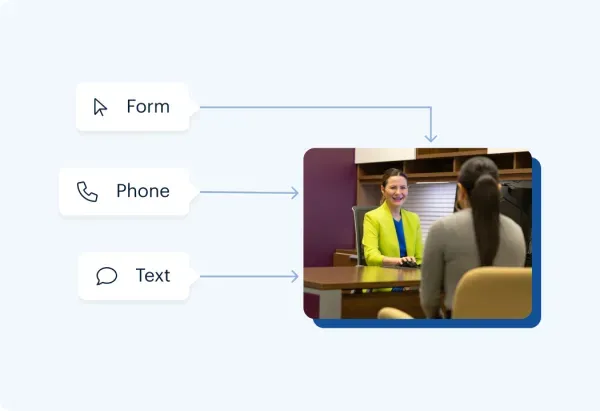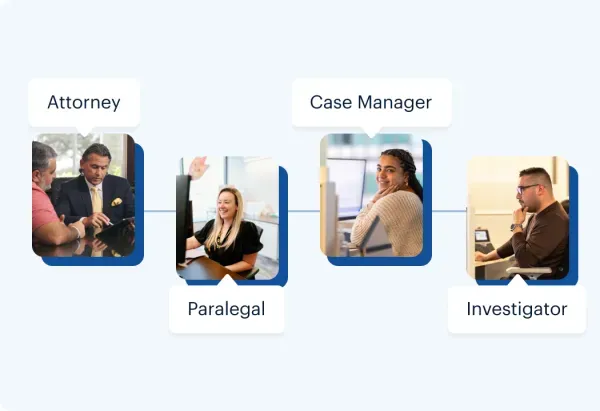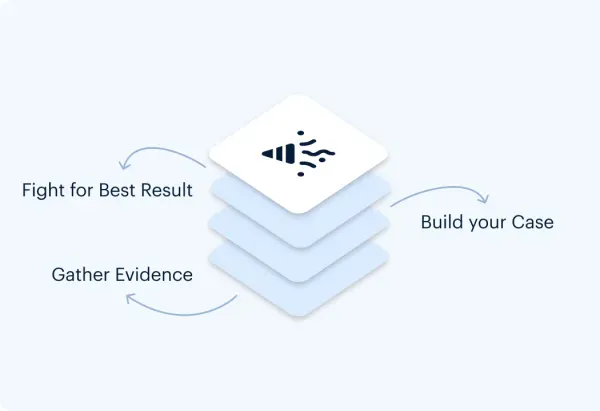Results may vary depending on your particular facts and legal circumstances. The attorney featured above is licensed in Florida. For a full list of attorneys in your state please visit our attorney page.
WHAT DOES IT MEAN TO GIVE A POLICE OFFICER FALSE INFORMATION?
We've helped thousands of people recover physically, financially, and emotionally after serious injuries.
Results may vary depending on your particular facts and legal circumstances. The attorney featured above is licensed in Florida. For a full list of attorneys in your state please visit our attorney page.
What Does It Mean to Give a Police Officer False Information?
Law enforcement officials are supposed to protect your community. To do so, they need to have the correct information during investigations so they can come to accurate conclusions and see justice served. Due to this reasoning, giving false information to police in Georgia is illegal. There are a variety of actions that can fall under this potential crime category. Giving a false name, birth date, and address can qualify as giving false information to the police. Additionally, it is illegal in Georgia to make a false statement to any government agency, including police officers. It is also illegal to file a false report with the police in Georgia. If you find yourself in trouble and you need assistance, contact Morgan & Morgan today for a free consultation so we can get you the help you need.
Cases in Georgia of Individuals Giving False Information to the Police
There have been many recent cases of people giving false information to police in Georgia. The following explanation may give you a better idea of what constitutes this illegal action.
For instance, Wynn v. State resulted in defendant Wynn being convicted of one count of giving a false name to a law enforcement officer, as well as two counts of felony obstruction. Two officers were searching for a fugitive and came across Wynn’s car. They saw an open container of alcohol and a can of beer next to the defendant Wynn, who was sitting in the driver’s seat. The officers identified themselves as police and asked the defendant to step out of the vehicle. They asked the defendant his name, which he claimed was “Mark Grimes.”
The defendant told the officers he had no identification on him and consented to being patted down. The officers discovered a wallet in Wynn’s pocket, and the defendant gave his consent for the officers to search it. Inside the wallet, the officers found an ID stating the defendant’s true name. Wynn explained that the ID card belonged to his brother. When brought to court, Wynn was found guilty of giving a false name to the police.
Another instance of a conviction for giving the police a false name is the case of Smith v. State. A woman was driving her sister’s car without permission and was involved in a car accident. The police questioned her after the accident, and she gave her sister’s name instead of her own. She claimed that she was in fact her sister and she signed her sister’s name on the Miranda form. When the case was brought to court, the defendant was found guilty of intentionally giving an officer a false name.
Examples of Making a False Report
You may be wondering what are some examples of giving false information to police in Georgia and if your actions broke the law. Some of the most common instances of this crime are individuals who falsely report a theft in order to collect an insurance settlement. One might also falsely accuse a spouse of domestic violence in retaliation for the spouse’s annoying behavior. That is a crime.
Other instances of filing a false report can include giving phony details regarding a situation by reporting that a crime has occurred when it has not, and also misstating the value of property that was stolen or damaged in some way.
As a note, if you make a false report about a bomb or a hazardous substance and this report turns out to be false, you may be found guilty of Transmitting a False Public Alarm. The penalty for this crime is more severe.
Examples of Giving a False Statement to the Police
Giving a false statement carries different penalties than making a false report and giving false information, and you may be wondering what actions constitute giving a false statement.
Creating or submitting a fake document in any matter involving a government agency, including the police, is considered as giving a false statement. An example of this could be if you altered or otherwise falsified information on a document that you are submitting to a police officer.
Another example is if you knowingly concealed information or covered up evidence that you were giving to the police. Lying to the authorities may also fall under this category.
You may be concerned that you will be charged with perjury for lying to a police officer. However, you should know that you can only be convicted of perjury if you are lying under oath. An example of perjury could be if you give a false testimony at a trial, since you must affirm that your testimony is truthful. You are not under oath when speaking to a police officer, so you cannot be charged with perjury, though you could be charged for other crimes.
150,000+ Five Star Reviews
The reasons why clients trust Morgan & Morgan.
Results may vary depending on your particular facts and legal circumstances. Based on select nationwide reviews.
Our Results
How It Works
Unsure what to do next? With 35 years of experience, our personal
injury lawyers will guide you every step of the way.

Contact Us 24/7 - It’s Free
Start your claim

Meet your dedicated attorney
Meet the attorneys

We fight for more
Learn more about the case process
Results may vary depending on your particular facts and legal circumstances. The attorneys shown in these photos may not be licensed in your state. To find an attorney licensed in your area, please visit our attorney page.
Local Care
Backed by America’s Largest Injury Law Firm.
$30 Billion
Recovered for clients
nationwide700,000+
Clients and families
served1,000+
Attorneys across
the country1
Click may change your life
The attorney featured above is licensed in Florida. For a full list of attorneys in your state please visit our attorney page.
Results may vary depending on your particular facts and legal circumstances.
In the Community
Discover the local Morgan & Morgan experience with news, events, and partnerships.
Learn More
Injured and not sure what to do next?
We'll guide you through everything you need to know.
Can Giving False Information Result in Other Charges?
In one of the cases outlined above (Wynn v. State), the defendant was convicted of both giving false information to the police and obstruction of justice. It is important to realize that making a false statement or giving false information to police in Georgia can lead to other charges, such as obstruction of justice. Obstruction of justice means that an individual has done something to delay, hinder, or otherwise obstruct a police officer in the performance of their official job responsibilities or duties.
Many actions that constitute giving false information to the police can also count as obstruction of justice. One example could be if you communicate deceptive or otherwise false information to a police officer. Destroying evidence could also constitute obstruction of justice. It is important to note that in Georgia, obstruction of justice could count as either a felony or a misdemeanor, depending on the situation.
What Are the Penalties for Giving False Information to the Police?
The penalties for giving false information to the police depend on the exact charge that you receive. If you are found guilty of giving a false name, address, or date of birth to a law enforcement officer in Georgia, you will likely be charged with a misdemeanor. You may receive a penalty of a $1,000 fine, one year in jail, or both if you are convicted.
What are the Penalties of Giving a False Statement to the Police?
If you are found guilty of giving a false statement to a police officer in Georgia, you may receive a fine up to $1,000, a prison sentence between one and five years, or both. In Georgia, this is charged as a felony, not a misdemeanor.
What are the Penalties of Making a False Report of a Crime?
If you are convicted of making a false report of a crime in Georgia, you may receive up to $1,000 in fines, up to one year in jail, or both. This is a misdemeanor.
If you are convicted of transmitting a false public alarm, you may be found guilty of a felony and not a misdemeanor. The penalties are much higher for this offense, carrying a minimum of five to ten years in prison and a fine of up to $100,000.
What are the Penalties for Obstruction of Justice?
If you receive a misdemeanor conviction for obstruction of justice in Georgia, you may receive a fine of up to $1,000, up to one year in jail, or both. This conviction may also come with community service or anger management classes, depending on the nature of the crime.
If you receive a felony conviction for obstruction of justice, you may receive a prison term between one to five years and a fine of at least $300. You may also be required to attend anger management classes or perform community service. Of note, you will be charged with a felony instead of a misdemeanor if you threaten a police officer with violence or actually commit violence against a police officer.
How Can I Fight This Charge?
There are a few ways you can fight the charges against you. It’s important to note that just because you were charged with an offense does not mean that you will be convicted. You still may be able to fight the charge.
One possible defense you could present is to claim that you gave a police officer false identifying information (such as your address or date of birth) because you were confused or possibly nervous. To be convicted of giving false information to police in Georgia, it must be intentional with the purpose of misleading a police officer.
A defense against a charge of making a false statement to a police officer could be that you did not realize you were hiding information. Under Georgia law, hiding information is also illegal, but intent matters in this case as well.Another defense against a charge of giving a police officer a false statement could be that it was an accident. There are a variety of ways in which you may be able to claim this defense. Perhaps you left out a detail that the police officer deems important, but you did not think it was important at the time. Alternatively, maybe you misinterpreted the situation, resulting in false information being given. Once again, Georgia law states that for you to be convicted of giving a false statement, you must willingly and intentionally do so. If you can prove that you mistakenly gave a false statement, you may not be convicted.
Morgan & Morgan may be able to help
These crimes can come with hefty penalties, even including jail time. If you are convicted of giving a false statement to a police officer, you will be charged with a felony. It is in your best interest to defend yourself against a charge before you are convicted, by hiring an experienced criminal defense attorney. Hiring a qualified attorney can ensure that you receive the best representation possible. An attorney who is well-versed in criminal law in Georgia can help craft the best defense for you. Contact Morgan & Morgan today for help.


























